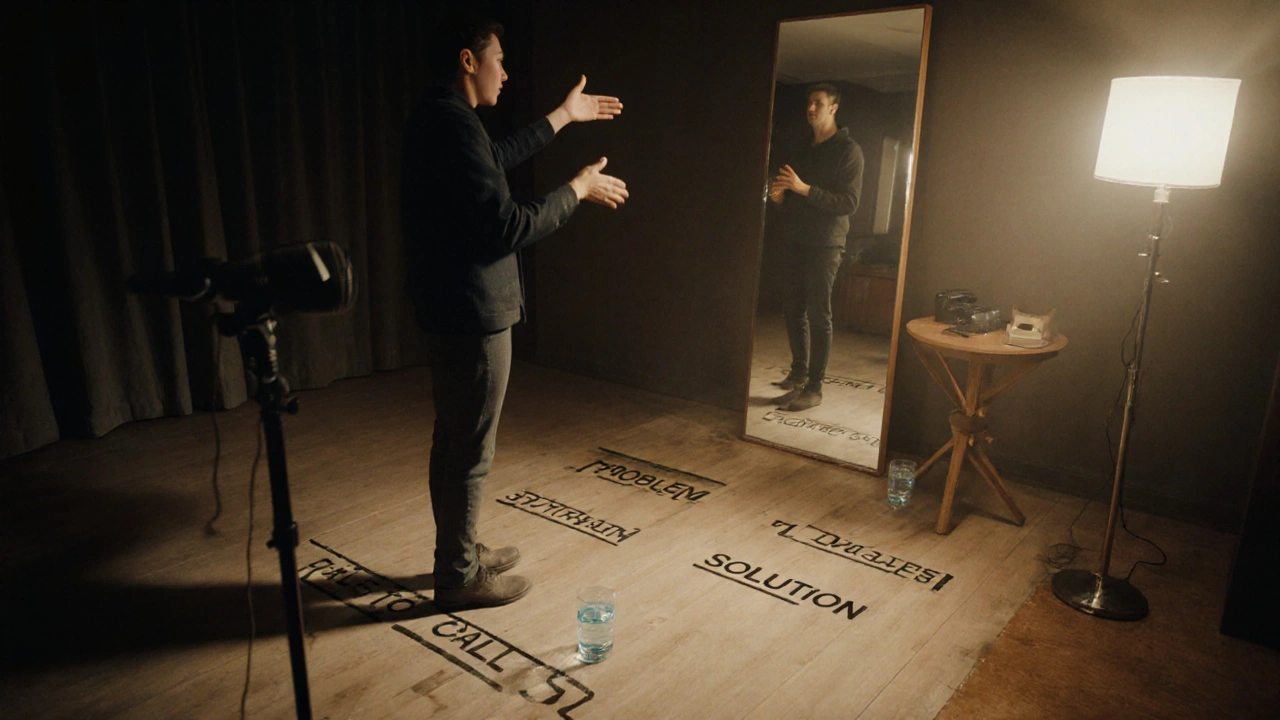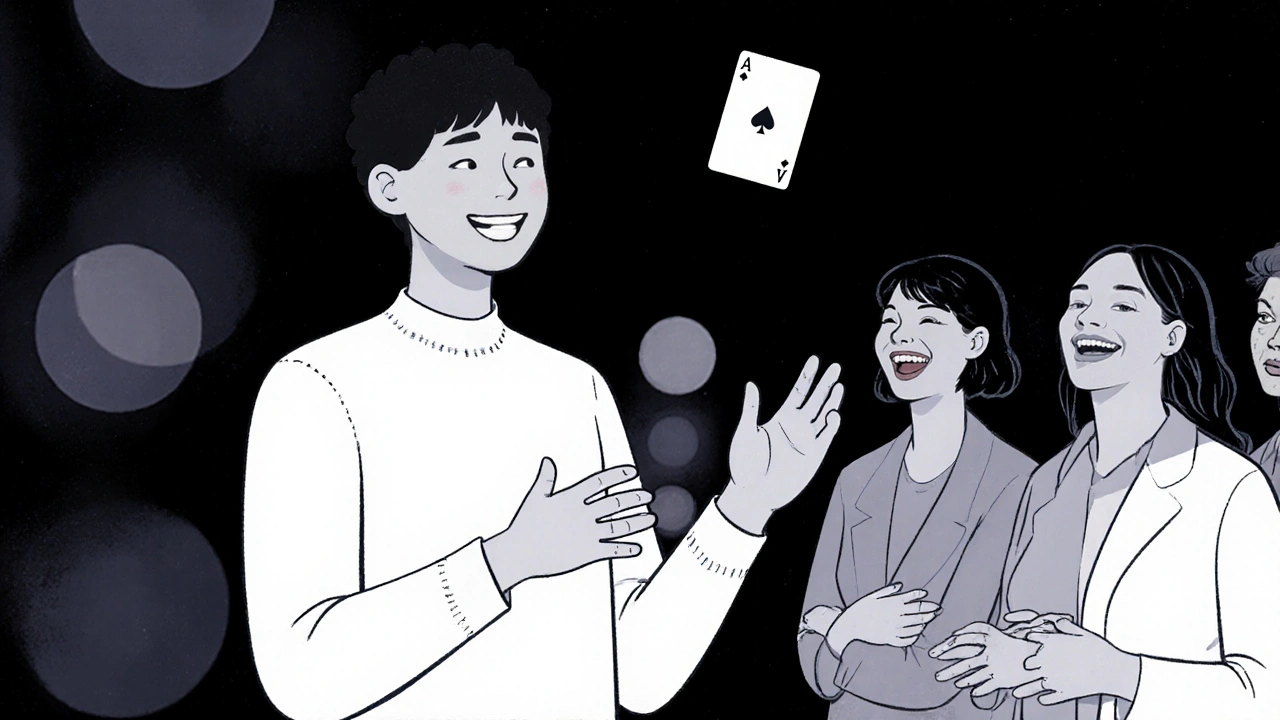Think magic tricks are just about rabbits in hats and sawing people in half? Think again. The same techniques that make a card vanish in front of your eyes can also make you stand taller, speak clearer, and hold an audience’s attention longer-no wand required.
Control the Attention
Magicians don’t rely on luck. They control where people look, when they look, and what they miss. That’s the same skill top speakers use. Ever noticed how a great presenter pauses right before dropping a key point? That’s misdirection. They’re not just saying something important-they’re making sure you’re fully tuned in when they say it.Practice this: When you’re rehearsing a speech, pick one sentence that’s your big moment. Before you say it, pause for two full seconds. Look around the room. Let the silence hang. Then deliver the line. You’ll feel how much heavier it lands. That’s not just timing-it’s psychology borrowed straight from the magic playbook.
Build Confidence Through Repetition
No magician walks on stage and says, “I hope this card trick works.” They’ve done it a hundred times. They’ve practiced in front of mirrors, friends, and even their pets. And when they mess up? They fix it until it’s flawless.Public speaking anxiety often comes from uncertainty: What if I forget my lines? What if they laugh? What if I sound stupid? Magic teaches you to eliminate those fears through repetition. Learn your material so well that even if your mind goes blank, your body remembers. A magician doesn’t panic when a card slips-they’ve practiced the recovery move ten times. You can do the same with your speech.
Try this: Record yourself giving your talk three times in a row. Don’t stop if you stumble. Keep going. Watch the video. Notice how your confidence grows with each run. That’s not just practice-it’s conditioning.
Use Movement to Own the Space
Watch a skilled magician. They don’t stand still. They move with purpose. A step to the left draws attention. A hand gesture draws the eye. A sudden stillness makes people lean in.Most speakers either pace like a caged animal or stand frozen like a statue. Neither works. Magic teaches you to move with intention. Every step, every hand motion, every shift in posture should serve a purpose.
Try this: Mark three spots on your floor-left, center, right. Each time you move to a new spot, say a different part of your message. Left = problem. Center = solution. Right = call to action. The physical movement anchors your ideas in the audience’s mind. It’s not just theater-it’s memory reinforcement.

Timing Is Everything
A magician doesn’t reveal the trick the second the audience looks away. They wait. They let the tension build. They know the longer the suspense, the bigger the payoff.Great speakers do the same. They don’t rush to fill silence. They let the audience sit with an idea. They pause after a punchline. They wait for laughter to die down before continuing.
Here’s a simple test: Next time you speak, count to three after you finish a sentence. Don’t rush into the next one. That pause gives people time to process. It makes you sound more deliberate. More in control. More confident.
Studies show that audiences perceive speakers who use strategic pauses as 37% more credible than those who talk nonstop (Journal of Nonverbal Behavior, 2023). That’s not magic. That’s science.
Engage the Emotions, Not Just the Facts
A magic trick isn’t impressive because it’s complex. It’s impressive because it makes you feel something-wonder, surprise, even a little fear. That’s the real power.Most presentations are just data dumps: “Our sales went up 12%,” “We launched in three cities,” “Our retention rate is 89%.” Boring. No one remembers that.
Magicians tell stories. They create characters. They make you care. Your speech should too. Instead of saying “Our product saves time,” say “Last week, Maria, a single mom working two jobs, got home at 8 p.m. and still had time to tuck her kids in. That’s what our tool did for her.”
Emotion sticks. Facts fade. Magic knows this. So should you.

Handle Mistakes Like a Pro
Even the best magicians drop a coin. They misplace a card. They fumble a flourish. But they never panic. They turn it into part of the act.When you mess up during a speech-forget a line, stumble on a word, lose your place-don’t apologize. Don’t say “Sorry.” Don’t try to hide it. Smile. Pause. Say something like, “That’s not how I planned it… but sometimes the best moments happen unplanned.” Then keep going.
That’s not just charm. That’s control. Audiences don’t remember your mistakes. They remember how you handled them. A magician who turns a slip into a laugh becomes more likable. So can you.
Practice the Invisible Work
Most people think magic is about flashy moves. But the real work happens before the show. The sleight of hand? Practiced for hours in silence. The misdirection? Planned down to the second. The confidence? Built through failure.Public speaking isn’t about being perfect. It’s about being present. And presence comes from preparation.
Here’s your challenge: Take one short talk-three minutes max-and rehearse it like a magic trick. Do it in front of a mirror. Record it. Do it with your eyes closed. Do it while walking. Do it while holding a glass of water. Do it until you can’t mess it up, even if you’re tired, stressed, or distracted.
That’s not just practice. That’s mastery.
Final Thought: You’re Already a Magician
You don’t need a cape or a top hat. You just need to understand this: every time you speak, you’re creating an experience. You’re making people feel something. You’re guiding their attention. You’re turning ordinary words into memorable moments.That’s magic.
Can magic tricks really help with stage fright?
Yes. Magic teaches you to reframe fear as focus. Instead of worrying about being judged, you learn to control the environment-your movements, your timing, your energy. That shift turns anxiety into anticipation. Magicians don’t eliminate nerves-they channel them. You can do the same.
Do I need to learn actual magic tricks to benefit?
No. You don’t need to master a card trick or make a coin disappear. You just need to borrow the principles: misdirection, timing, movement, emotional storytelling, and recovery from mistakes. These are mental tools, not performance skills. Practice them in your speeches, not in a magic show.
How long does it take to see improvement?
You’ll notice a difference after just one session. Try using a single technique-like pausing for two seconds before your key point-and you’ll get immediate feedback from your audience. Real mastery takes weeks, not years. Practice one magic-inspired technique per week, and in six weeks, you’ll sound like a seasoned speaker.
Is this only for professional speakers?
No. This works for anyone who speaks in front of others-teachers, managers, students giving presentations, parents speaking at school events, even people giving toasts at weddings. If you’ve ever felt nervous before speaking, magic techniques can help. You don’t need a title to be a storyteller.
What’s the most important magic trick for public speaking?
The most powerful trick? The pause. It’s silent, simple, and universally effective. It gives your audience time to breathe, think, and feel. It makes you look calm. It makes your words matter more. Master the pause, and you’ve mastered the foundation of every great speech.

